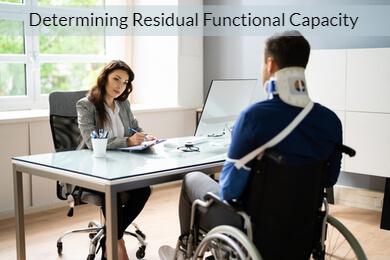Principal Office Located at 1424 Gables Court, Plano, TX 75075
Call Today For a Free Case Evaluation
Recent Blog Posts
How Will Medical Opinions Affect a Social Security Disability Case?

People who experience serious injuries or illnesses may rely on government aid to meet their needs. Social Security disability benefits may be available to a person who has suffered from a disabling health condition that has affected them for at least one year or is expected to last for 12 months or more. To demonstrate that they qualify for disability benefits, a person will need to provide medical evidence, and in some cases, Social Security may also require them to be examined by an independent medical professional. In some cases, these professionals may come to different conclusions, and applicants should understand how Social Security will consider opinions from different sources.
How Social Security Weighs Medical Opinions
Social Security may look at reports provided by multiple different types of medical professionals. A professional must be considered an acceptable medical source, meaning that they can provide reports that are relevant to a person’s disabling health conditions. These sources may include medical or osteopathic physicians, licensed psychologists who can assess a person’s mental health issues, optometrists who can address visual impairments, podiatrists who can assess disorders affecting the feet or ankles, speech-language pathologists who can address language disorders and related impairments, audiologists who can assess hearing loss, physician assistants who can assess impairments within their licensed scope of practice, and licensed advance practices registered nurses (including nurse practitioners, certified nurse midwives, and clinical nurse specialists).
Can I Qualify for SSD Benefits Because of a Skin Condition?

While there are multiple types of health conditions that can affect a person, issues affecting the skin may seem to be relatively minor. Rashes, bumps, or irritated skin can be troublesome, but these issues do not significantly affect most people. However, there are some cases where skin disorders are severe enough that they affect a person’s ability to work and their overall health and well-being. In these cases, a person may be able to qualify for Social Security disability benefits.
Social Security Listings for Skin Disorders
As with other types of disabilities, a skin condition must be severe enough to limit a person’s ability to maintain substantial gainful activity before they will be able to receive disability benefits through Social Security. The Listing of Impairments, which details conditions that are severe enough to be considered disabilities, includes a section for skin disorders, and it notes that a person’s condition is evaluated based on the frequency and severity of the skin lesions a person experiences, while also considering factors such as how a person reacts when exposed to toxins or allergens, whether there is any seasonal variation in their condition, and whether they need to remain in a protected environment.
What Is Residual Functional Capacity in a Social Security Disability Case?
 When applying for Social Security disability benefits, a person will need to provide multiple forms of medical evidence. To determine whether a person is disabled and qualifies for benefits, Social Security will evaluate their residual functional capacity (RFC). Understanding what is meant by this term and how it is determined will ensure that a person can demonstrate that they are disabled and need SSD benefits to help them meet their needs.
When applying for Social Security disability benefits, a person will need to provide multiple forms of medical evidence. To determine whether a person is disabled and qualifies for benefits, Social Security will evaluate their residual functional capacity (RFC). Understanding what is meant by this term and how it is determined will ensure that a person can demonstrate that they are disabled and need SSD benefits to help them meet their needs.
Determining Residual Functional Capacity
A person’s residual functional capacity refers to the maximum amount of work they are able to do with the physical or mental limitations they are experiencing. To determine RFC, Social Security will look at a person’s medical records, including those provided by a person’s own doctor as well as reports from medical examinations from independent doctors. Social Security may also consider a person’s own explanation of their limitations and how their conditions have affected them, as well as statements from family members, friends, or others who may be able to provide insight into the case.
What Is the Process for Appealing a Denial of SSD Benefits?
 For those who suffer from physical or mental conditions that affect their ability to work, Social Security disability benefits can provide much-needed assistance. Unfortunately, a significant percentage of disability claims are denied. However, a denial does not mean that it will not be possible to receive SSD benefits. An applicant can appeal the decision to deny a claim and provide additional medical evidence or other information showing that they qualify for disability benefits. During these types of cases, an applicant can work with an attorney to ensure they meet all of their requirements, and they will want to understand the process that will be followed during their appeal.
For those who suffer from physical or mental conditions that affect their ability to work, Social Security disability benefits can provide much-needed assistance. Unfortunately, a significant percentage of disability claims are denied. However, a denial does not mean that it will not be possible to receive SSD benefits. An applicant can appeal the decision to deny a claim and provide additional medical evidence or other information showing that they qualify for disability benefits. During these types of cases, an applicant can work with an attorney to ensure they meet all of their requirements, and they will want to understand the process that will be followed during their appeal.
Steps in a Social Security Disability Appeal
When appealing the denial of a SSD claim, a person will generally proceed through the following steps:
-
Reconsideration - Within 60 days after the denial of a disability claim, a person can file a Request for Reconsideration. During a reconsideration, Social Security may perform a case review in which a person will look at the information provided in the initial application and any supplemental information provided by the applicant. In some cases, an applicant may request an informal or formal conference where they can speak to the person reviewing the case and witnesses can be questioned. The person reviewing the case will issue a decision on whether to grant or deny disability benefits.
How Is Hearing Loss Evaluated in Social Security Disability Cases?
 Those who experience health issues that prevent them from being able to maintain gainful employment may be able to receive disability benefits through Social Security. There are multiple different types of health conditions that are recognized as disabilities by Social Security, but an applicant for disability benefits will need to meet specific requirements to demonstrate that they are disabled. People with hearing impairments will need to understand how these disabilities are addressed in the listing of impairments used by Social Security.
Those who experience health issues that prevent them from being able to maintain gainful employment may be able to receive disability benefits through Social Security. There are multiple different types of health conditions that are recognized as disabilities by Social Security, but an applicant for disability benefits will need to meet specific requirements to demonstrate that they are disabled. People with hearing impairments will need to understand how these disabilities are addressed in the listing of impairments used by Social Security.
Hearing Loss Without Cochlear Implants
For those who have not had surgical implants to correct hearing loss, the determination of whether they are disabled will depend on the results of medical examinations and hearing tests. An otologic examination must be performed by a licensed physician, and it will look at a person’s medical history and the ways hearing loss has affected their life. A doctor will examine the person’s external ears, the eardrum, and the middle ear to look for abnormalities or issues that may affect the person’s hearing.
What Is the Difference Between SSDI and SSI Benefits?
 People in the United States who are unable to work may be able to receive benefits through the federal government. Social Security offers disability benefits to those who experience physical or mental conditions that prevent them from earning enough income to support themselves, as long as a person’s condition has lasted or is expected to last for 12 months or more. There are two different types of Social Security disability benefits: Social Security Disability Insurance and Supplemental Security Income. Understanding the differences between these two programs will help a person with a disability understand the types of benefits they may be able to receive.
People in the United States who are unable to work may be able to receive benefits through the federal government. Social Security offers disability benefits to those who experience physical or mental conditions that prevent them from earning enough income to support themselves, as long as a person’s condition has lasted or is expected to last for 12 months or more. There are two different types of Social Security disability benefits: Social Security Disability Insurance and Supplemental Security Income. Understanding the differences between these two programs will help a person with a disability understand the types of benefits they may be able to receive.
Qualifying for SSDI With Work Credits
Social Security Disability Insurance, or SSDI, provides benefits based on a person’s work history. To qualify for SSDI, a person must have earned sufficient work credits throughout their career. A person can earn up to four work credits per year, and these credits are based on the amount they earned in a particular year. For 2021, earnings of $1,470 will constitute one work credit, and a person will earn all four credits for the year once they make $5,880.
How Does Social Security Determine Whether a Person Is Disabled?
 Those who suffer from health conditions that affect their ability to work may be able to receive disability benefits through Social Security. To qualify for Social Security disability, a person will need to demonstrate that they have a disabling condition that has affected their ability to earn enough income. When evaluating a disability claim, Social Security uses a specific process to determine whether an applicant’s condition is considered a disability. By understanding this process and working with an attorney to provide the proper evidence and documentation, a person can ensure that they will be able to receive the benefits they need.
Those who suffer from health conditions that affect their ability to work may be able to receive disability benefits through Social Security. To qualify for Social Security disability, a person will need to demonstrate that they have a disabling condition that has affected their ability to earn enough income. When evaluating a disability claim, Social Security uses a specific process to determine whether an applicant’s condition is considered a disability. By understanding this process and working with an attorney to provide the proper evidence and documentation, a person can ensure that they will be able to receive the benefits they need.
The Five-Step Evaluation Process for Assessing Disability
After a person applies for Social Security disability benefits, their claim may be approved or denied. Following a denied claim, an applicant can appeal this decision, and an administrative hearing will be held in which their case will be reviewed by an administrative law judge (ALJ). The ALJ will use what is known as a “sequential evaluation” process to determine whether the person is disabled. This process includes five steps:
Can People With Mental Illnesses Receive Social Security Disability?
 There are a variety of conditions that can affect a person’s ability to maintain employment and earn enough income to support themselves. Fortunately, Social Security disability benefits, including Social Security Disability Insurance (SSDI) and Supplemental Security Income (SSI), are available for those who suffer from debilitating conditions.
There are a variety of conditions that can affect a person’s ability to maintain employment and earn enough income to support themselves. Fortunately, Social Security disability benefits, including Social Security Disability Insurance (SSDI) and Supplemental Security Income (SSI), are available for those who suffer from debilitating conditions.
In addition to serious physical conditions that limit the types of work-related activities a person can perform, there are multiple types of mental illnesses that may allow a person to qualify for disability benefits. However, proving that a person’s condition is severe enough to be considered a disability can often be a complex process, and those who are applying for Social Security disability benefits will want to work with an experienced attorney to ensure that they provide the correct information to demonstrate the need for financial assistance.
Common Injuries That Qualify for SSDI Payments
 While any injury can be traumatic, it's hard to overstate the difficulties that follow from an injury that prevents you from performing the job you've done all your life. Fortunately, the federal government can help by providing monthly benefits through its Social Security Disability Insurance ('SSDI') and Supplemental Security Income ('SSI') programs. However, to qualify for these benefits, you must show that your inability to work results from a specific injury or illness.
While any injury can be traumatic, it's hard to overstate the difficulties that follow from an injury that prevents you from performing the job you've done all your life. Fortunately, the federal government can help by providing monthly benefits through its Social Security Disability Insurance ('SSDI') and Supplemental Security Income ('SSI') programs. However, to qualify for these benefits, you must show that your inability to work results from a specific injury or illness.
At Coats & Todd, we want you to know how to identify if you qualify for SSDI and SSI benefits so that you can move forward without the added financial stress that follows from being unable to work. Our team is here to help you every step of the way.
In Its Final Weeks, the Trump Administration Makes It Harder Than Ever for Disabled Americans to Get and Keep Their Social Security Disability Benefits
 With only a few weeks left, the Trump Administration has upended a number of rules to make it harder to receive (and even keep) Social Security disability benefits. The White House announced a number of sweeping changes to reduce the number of people on Social Security and to save about $2.5 billion a year.
With only a few weeks left, the Trump Administration has upended a number of rules to make it harder to receive (and even keep) Social Security disability benefits. The White House announced a number of sweeping changes to reduce the number of people on Social Security and to save about $2.5 billion a year.
Some of the biggest new changes to Social Security are:
- Stricter requirements for back impairments: One of the most prevalent disabilities we see are disabling back impairments, particularly those involving the lower ('lumbar') spine. But under new rules effective starting April 21, 2021, the government will no longer grant benefits to people who are unable to walk effectively due to low back impairments. Now, you have to prove you have to use some prosthetic device that prohibits you from using either arm. So a one-handed walker or cane apparently isn't enough. What's more, the rules say that all of the necessary medical findings have to be documented within a 4-month time period-despite a court of appeals ruling that rejected that position! See Radford v. Colvin, 734 F.3d 288 (4th Cir. 2013). Although the Administration used to abide by that appeals court ruling, they've changed their mind. Understandably, several people have objected to these changes. However, the Administration responded that, 'even if in some cases (although not all) the revised rule results in more [denials], we still have a statutory obligation to ensure the listings are up to date... ' Despite the White House's focus on achieving 'progress,' we suspect this will have a devastating effect on millions of Americans for decades to come.

 972-671-9922
972-671-9922





